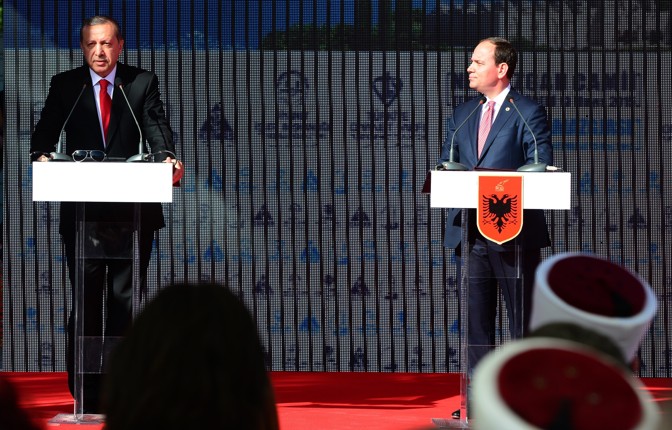Mon 03 June 2019:
Ankara is funding thousands of mosques out of more than just goodwill.
Instead, the building echoes classic Ottoman architecture, and for good reason—it is being funded by Turkey. It’s among a series of new mega-mosques constructed by Turkish President Recep Tayyip Erdoğan’s government at home and abroad. One in Accra, Ghana, is the largest in West Africa. Another in Bishkek, Kyrgyzstan, is the largest in Central Asia. A complex in Maryland is said to be the largest of its kind in the entire Western Hemisphere. There are at least 2,000 others of various sizes that are funded by Ankara, and still more have been planned or discussed in places such as Venezuela, where Erdoğan is bolstering Nicolás Maduro’s beleaguered government, and Cuba, which Erdoğan claimed Muslim sailors reached before Christopher Columbus. Once completed, many of these mosques remain controlled by Ankara, and—in areas with large Turkish diasporas—deliver the same state-mandated weekly sermon heard in every city, town, and village back in Turkey.

The Ottoman style of Tirana’s new mosque is distinct from all other architecture in the city. (Gent Shkullaku / AFP / Getty)
Erdoğan has faced criticism from Western powers in recent years for actions seen as anti-democratic and illiberal: Perceived domestic enemies have been purged and jailed; Kurdish armed groups have been attacked in both Syria and Iraq; banks and foreign powers have been harangued for Turkey’s own financial woes. At the same time, his government has progressively expanded a global soft-power campaign, and mosques are only the most obvious result. It also supports religious schooling, a program for restoring Ottoman-era buildings, and extensive social and aid operations. Most beneficiaries have so far welcomed the assistance, but a few, notably in Germany, now worry that Turkish influence could deepen their own communal divides or even be a vehicle for espionage.

Erdoğan speaks alongside Albanian President Bujar Nishani at the 2015 groundbreaking ceremony for the mosque. (Dilek Mermer / Anadolu Agency / Getty)
For a while, Tirana’s Muslim majority lost out. In the center of the capital, only Et’hem Bey Mosque had survived the Hoxha era, and it has room for just a few dozen at prayer time. Come festivals and holy days, worshippers had to gather outside, in Skanderbeg Square. So in 2010, the city’s mayor, Edi Rama, approved the construction of a new mosque, funded by the Diyanet. Erdoğan attended the groundbreaking ceremony five years later and thanked Rama, who by then was prime minister.
There have been gripes about Turkish involvement, and about the architectural style of the building, which will be called the Great Mosque of Tirana, but its construction is seen by many as only the latest foreign power to take an interest in their country, the Albanian historian Auron Tare told me. “There’s a religious competitiveness,” he said. “You have these different countries, these different sorts of religious bodies who are all converging here.” Turkish money has also reached Albania through the Turkish Cooperation and Coordination Agency (TİKA), which distributes most of the country’s development assistance and which has carried out more than 200 projects there, according to Erdoğan’s office, including restoring Ottoman mosques. The agency is also funding various other programs in Tirana, such as park development and the construction of university dorms, the city’s current mayor, Erion Veliaj, told me. Albania is still one of the poorest countries in Europe, and he’s happy to spare his own budget. However, a TİKA spokesman told me the organization had no relevant restoration projects in Albania, despite listing a number on its website, and did not reply to further requests for comment.






